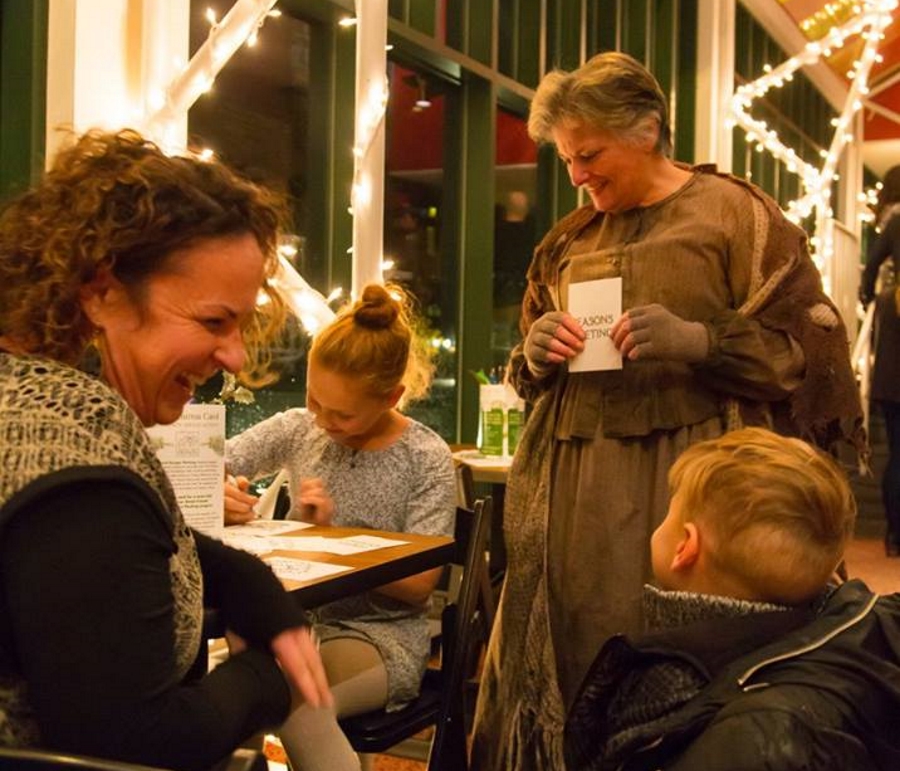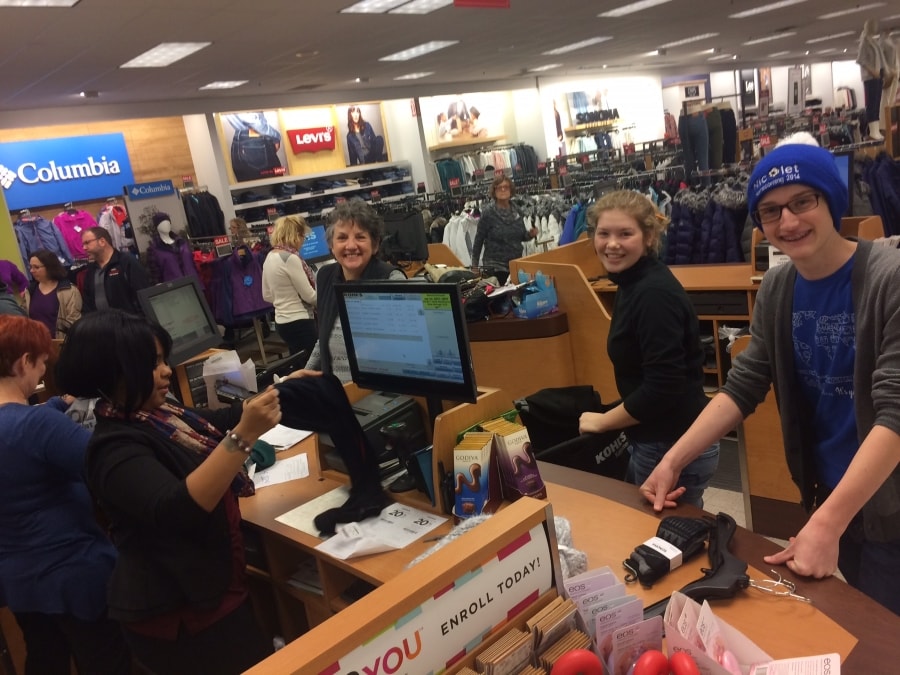In a time when exclusionist rhetoric and hate crimes seem to be on the rise, theatres across the country are using productions of A Christmas Carol to advocate for inclusion and to support their communities.
“It is a story of how when a person changes, it can transform an entire community,” says Adam Immerwahr, currently directing A Christmas Carol at the McCarter Theatre Center in Princeton, N.J. His production, which runs Dec. 9-31, focuses on the story of Scrooge’s impact on the community, both before and after his character transformation.
Many theatre companies engage their audiences with lobby displays and post-show talkbacks, and theatres staging A Christmas Carol are taking the themes of the play outside the four walls of the theatre by holding food drives, donating presents, and raising funds for local organizations.
Casting Community
In addition to hiring local actors, Connecticut’s Hartford Stage has cast the graduating class of actors at the nearby Hartt School, and more than 20 children from the community in its production, which runs Nov. 25-Dec. 30.
McCarter Theatre cast a diverse community ensemble, with 40 members ranging in age from 3 to 80, in its production. The casting process began last January to give enough time to spread the word and hold auditions at multiple community partner sites, such as the nearby Hamilton YMCA and Trinity Cathedral. Casting that far ahead allowed adults the time to arrange their schedules so they could participate in weekend rehearsals and 32 performances. Choreographer Lorin Latarro has even incorporated ensemble members’ unique skills, which include a viola performance and two tap-dancing teenage brothers.
The characters of Ghost of Christmas Present and Fan are played by community ensemble members Mimi Graves and Kelsey Carroll. Children in the ensemble play the Ghost of Christmas Past, the Cratchit children, Turkey Boy, and party guests.
“In each of these moments, the larger community of London—but at the same time, of Mercer County—is present,” says Erica Nagel, McCarter’s director of education and engagement, of the ensemble scenes.
In a note to director Immerwahr, community ensemble member Lew Gantwerk wrote: “During the last run-through when Marley thundered, ‘Mankind is my business,’ I thought he could have added ‘and our director’s too.’” Gantwerk felt that Immerwahr’s casting choices, which upend race, age, and gender expectations, and the director’s “message that all of us are needed and important contributors to the production,” reinforced “the message that mankind is our business. You have created a community where we all are living under that meta-message.”

Adapting for Community
Neighborhood pawnshops were the inspiration behind Vancouver’s Bah! Humbug!, a music-filled adaptation that focuses on the Downtown Eastside (DTES), one of the five poorest neighborhoods in Canada. According to Michael Boucher, the Simon Fraser University director of cultural programs/partnerships, pawnshops are ever-present financial predators in the Downtown Eastside, and thus felt like the most fitting place to set Scrooge’s accounting firm in the adaptation. Bah! Humbug!, now in its seventh year, was commissioned and is coproduced by SFU Woodward’s Cultural Programs with Vancouver Moving Theatre in partnership with Full Circle: First Nations Performance, a nonprofit arts program supporting indigenous artists of Canada. The cast comes from both Vancouver Moving Theatre and Full Circle, including First Nations Performance artists as well as DTES community actors and a children’s choir. The show ran Dec. 8-17.
The narrative spine of the production remains Dickens’s story, but, as Boucher clarifies, it is framed under a First Nations spiritual sensibility and is set in a 21st-century reality. The three ghosts come from the First Nations, the indigenous peoples of the North Americas.
The play begins with a native carver completing a Haida-styled design on a crutch. In Bah! Humbug!, the crutch is used throughout the play, Boucher explains, as a recurring symbol of both human frailty and each person’s potential to develop inner strength and courage.
Residents can enjoy that Scrooge sends a boy to get a turkey at the local Vancouver store Save-on-Meats. In her refusal to toast Scrooge, Mrs. Cratchit states: “The Founder of the Feast, indeed! No one can support a family on minimum wage, especially in Vancouver!” The local references are not just for laughs—Boucher emphasizes that each production of Bah! Humbug! goes deeper into the history of Vancouver’s Downtown Eastside. This year Fezziwig’s workplace setting has been changed to a Japanese cannery, a major industry for the area in the years prior to World War II. Every year, local muralist Richard Tetrault adds new large-scale mono-prints and linocut projections, some of which include houses in East Vancouver.
The script is also fine-tuned to reflect current issues. This year’s show includes references to the fentanyl opioid crisis and the topic of “renoviction,” a gentrifying trend in which landlords evict tenants to do remodeling, then rent the units at a higher price. For Boucher, Bah! Humbug! shifts emphasis from Dicken’s progressive 19th-century theme of charity amid the Industrial Age to its contemporary progressive equivalent, social justice. In harmony with that goal, Bah! Humbug! pays all of its artists and serves as a fundraiser for community arts in DTES.

Staff Involvement
Milwaukee Repertory’s A Christmas Carol Families Program, in conjunction with its annual production (Nov. 29-Dec. 24), raises nearly $40,000 each year. This year, thanks to an audience member’s matching donation, they may raise up to $100,000. It started with one actor wanting to raise money to buy presents for families in need, and it continues with actors asking for donations at each performance. The theatre works with a local community organization—this year it is the Boys and Girls Club of Greater Milwaukee—to determine what gifts to purchase. A volunteer staff committee then buys, wraps, and delivers the gifts, and any leftover funds go directly to the Boys and Girls Club of Greater Milwaukee. As managing director Chad Bauman attests, Milwaukee Rep’s Families Program has become as much a tradition as the show itself.
Raising Funds
Like Scrooge after his transformation, audience members across the country are looking for ways to help their community. Theatres can help raise funds, donate food, and also showcase how local community partners are addressing needs in the audience’s hometown. This year McCarter Theatre is partnering with Mercer Street Friends and will raise money for the organization, whose mission is to bridge opportunity gaps and help families and communities make the journey out of poverty. In the first two weekends of A Christmas Carol, the theatre raised $28,000 toward the effort. The theatre lobby displays information about Mercer Street’s programming, including the Send Hunger Packing initiative, through which weekend meal packs are sent weekly to more than 1,000 school children struggling with food insecurity. Audiences are invited to write a card to the children who will receive a meal pack.
Thinking Locally
When looking for a community partner for their food drive, Hartford Stage had only to look across the street to find Hands on Hartford at work, serving meals at the Christ Church Cathedral. Located in downtown Hartford, Hands on Hartford’s programs extend across the city with a senior community café and a backpack nutrition program.
Hartford Stage’s community engagement associate, Theresa MacNaughton, worked with Hands on Hartford to learn what food items were needed, and together they developed a delivery schedule for food pickups. MacNaughton and the house management staff designated where to house the donations and worked with volunteers and box-office staff in guiding patrons through the donation process. To spread the word about this initiative, now in its second year, they posted on Facebook, sent weekly email reminders to ticket holders, and distributed press releases. The local FM station gave them a shout-out, too. Just three weeks into performances, they have collected nearly 900 pounds of food.

Lobby Displays
At Hartford Stage, the lobby showcases the Postcards Exchange program, displaying correspondence between 4th- and 5th-grade West Hartford students and artists or characters in a Shakespeare play or A Christmas Carol. An hour before the show, McCarter ensemble members greet audience members and invite them to join a sing-along, create a family craft, and play a children’s game in the lobby. Ensemble members share a pre-show “Inside Story,” which outlines things to look out for in the performance, and helps explain the role of the ensemble to the audience.
“[The ‘Inside Story’] explains how the group is very diverse to reflect the beautiful diversity of our local community, so that all different kinds of audience members can see themselves onstage,” says Nagel.
Extending the Invitation
Hartford Stage sponsors a free community night for families and individuals who might not otherwise be able to attend A Christmas Carol. Milwaukee Rep gives out 2,500 free “Tiny Tim Tickets” over the course of the show’s run to local social service organizations. The Literacy Services of Wisconsin invited English language learners—originally from Iran, El Salvador, Mexico, South Korea, and Spain—along with their tutors, who had helped the students prepare for the show. The students loved the performance, and the Literacy Services of Wisconsin appreciated being able to share Milwaukee’s tradition with students who came from around the world.
Hartford Stage also created a sensory-friendly performance that enables families with members who are on the autism spectrum, have anxiety, or have a range of cognitive abilities to attend A Christmas Carol together. Working with the Theatre Development Fund, Hartford Stage has adjusted the performance to be more accommodating of those with sensory sensitivities. Some sound and light cues are softened and house rules are relaxed. Families can download character and story guides and music from the show. Every choice has been made to “create an environment where people with autism or sensory needs, along with their families, can enjoy coming to the theatre together and will feel comfortable, supported and free to be themselves,” says Jennifer Roberts, director of education at Hartford Stage.
While Scrooge’s ghostly visitations alter his outlook, ultimately it is his outreach and his advocacy for those around him that truly changes him. That action tends to get less time onstage, but as theatres reach out to their communities around them, they can still help that message hit home.


